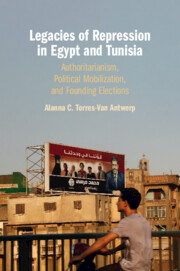 Legacies of Repression in Egypt and Tunisia
Legacies of Repression in Egypt and Tunisia Book contents
- Legacies of Repression in Egypt and Tunisia
- Legacies of Repression in Egypt and Tunisia
- Copyright page
- Dedication
- Contents
- Figures
- Tables
- Acknowledgments
- Introduction
- 1 Authoritarian Politics and Founding Elections
- Part I Members of the Club or the Only Game in Town?
- Part II Phoenix from the Ashes
- Part III Epilogue
- 6 When the Dust Settles
- 7 Authoritarian Legacies and the Prospects for Democratic Consolidation
- Appendix
- References
- Index
6 - When the Dust Settles
Authoritarian Legacies beyond Founding Elections
from Part III - Epilogue
Published online by Cambridge University Press: 10 March 2022
- Legacies of Repression in Egypt and Tunisia
- Legacies of Repression in Egypt and Tunisia
- Copyright page
- Dedication
- Contents
- Figures
- Tables
- Acknowledgments
- Introduction
- 1 Authoritarian Politics and Founding Elections
- Part I Members of the Club or the Only Game in Town?
- Part II Phoenix from the Ashes
- Part III Epilogue
- 6 When the Dust Settles
- 7 Authoritarian Legacies and the Prospects for Democratic Consolidation
- Appendix
- References
- Index
Summary
In Chapter 6, we find evidence that opposition successor parties from more closed opportunity structures experience centrifugal strains caused by the amalgamation of ideological orientations and perspectives that they represent. These strains lead to elite polarization that cause movement fracture and collapse. Conversely, opposition successor parties from more open opportunity structures are ideologically more coherent and thus do not suffer the same centrifugal tensions. Second, we see that nearly all opposition successor parties experience a dramatic decline in popularity after founding elections, due the ephemerality of symbolic resources in general (oppositional credibility, in this context). The positive reputations that helped opposition groups persuade citizens to vote for them in founding elections break down under economic strain and political disfunction that so frequently plague new democracies. Finally, we see that in contexts in which authoritarian state institutions persist beyond the transition, the resurgence of state repression against opposition successor parties becomes more likely, while authoritarian successor parties, in contrast, can integrate former regime members into the new democratic political system.
- Type
- Chapter
- Information
- Legacies of Repression in Egypt and TunisiaAuthoritarianism, Political Mobilization, and Founding Elections, pp. 239 - 272Publisher: Cambridge University PressPrint publication year: 2022


